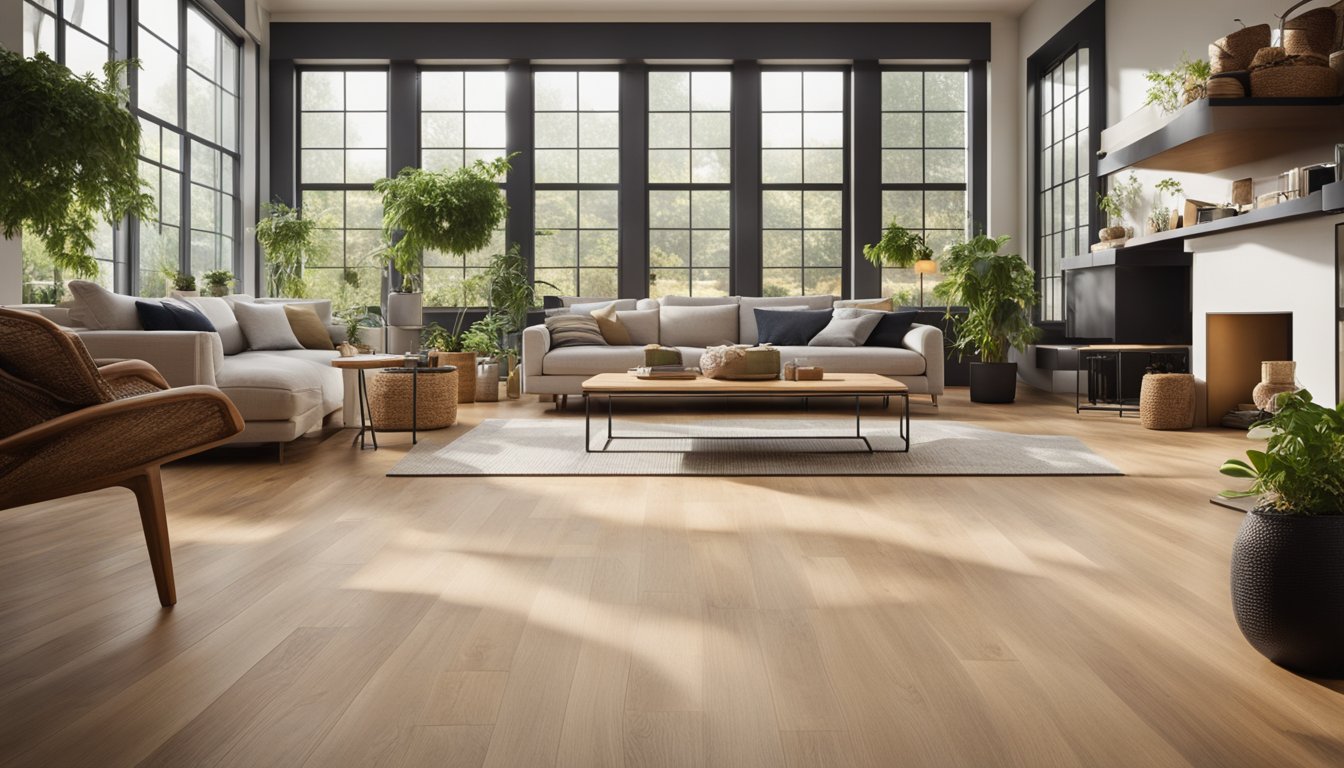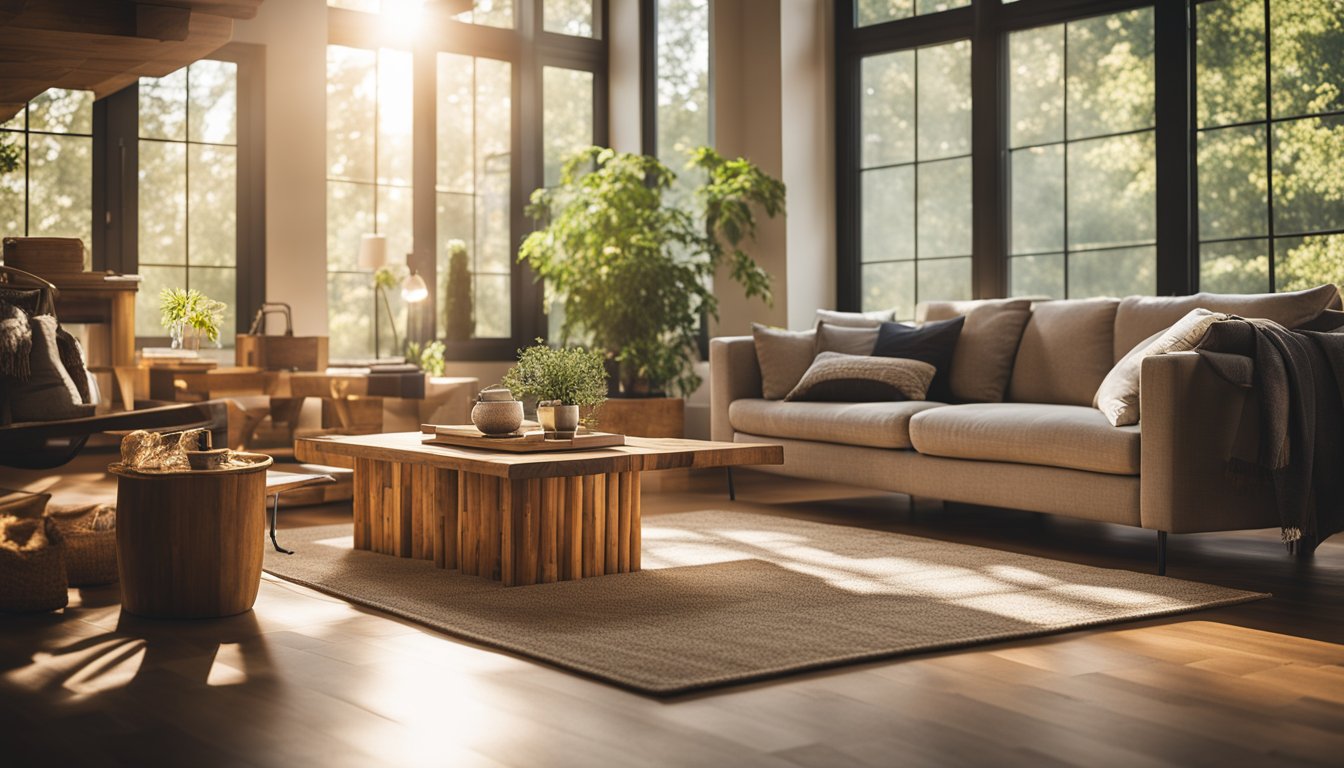Late updated: 15 Dec 2024 08:12
Written by: Eleanor Hartman
Eco-Friendly Flooring Options For UK Homes: Sustainable Choices for Modern Living
As awareness of climate change and environmental issues grows, more UK homeowners are looking towards sustainable solutions for their properties. Flooring, a fundamental aspect of any home, offers a significant opportunity to reduce environmental impact. By choosing eco-friendly flooring options, we can not only enhance the aesthetics of our homes but also contribute to a healthier planet. This choice reflects our commitment to sustainability and personal wellbeing.

Incorporating sustainable materials such as bamboo, cork, and responsibly sourced timber can reduce the carbon footprint of home improvement projects. These materials are not only durable but also promote better indoor air quality by emitting fewer volatile organic compounds. Interior designers and homeowners alike have begun prioritising these elements, transforming living spaces into green homes.
The diverse range of eco-friendly flooring options available today means we can make conscientious decisions without compromising on style or function. From rustic reclaimed wood to sleek bamboo panels, sustainability in flooring offers something for every taste and style preference. Our exploration of these options not only supports environmental stewardship but also enhances the overall quality and wellbeing of our living spaces.
Key Takeaways
- Eco-friendly flooring supports sustainable living and environmental health.
- Bamboo, cork, and sustainable timber are top choices for green flooring.
- Choosing sustainable floors can improve indoor air quality and wellbeing.
Assessing Environmental Impact and Benefits

When considering eco-friendly flooring for UK homes, it is essential to examine both their environmental impacts and their potential benefits.
Indoor Air Quality and Low Emission Materials
Sustainable flooring options significantly impact indoor air quality. We should consider materials that release low levels of volatile organic compounds (VOCs). Natural materials like cork, bamboo, and linoleum tend to emit fewer VOCs, improving indoor air quality.
Low emission flooring not only enhances air quality but also supports healthier living environments. Increased awareness has driven manufacturers to develop options that are both aesthetically pleasing and environmentally responsible, like low-VOC adhesives and finishes. It is crucial to select flooring that is both durable and made from renewable resources, reducing the need for replacements and supporting a cleaner, cradle-to-cradle lifecycle.
Carbon Footprint Reduction
Reducing the carbon footprint of our homes is a pivotal aspect of sustainable living. Flooring can play a vital role in this process. Materials such as bamboo and cork are prime examples of sustainable resources. They grow rapidly and require less energy to process compared to traditional hardwoods.
Moreover, recycled materials such as reclaimed wood and recycled metal tiles contribute to energy saving by reducing the need for new raw materials. By favouring products designed with the circular economy in mind, we minimise waste and promote ongoing use of resources.
Ensuring Biodiversity Through Sustainable Practices
The preservation of biodiversity is another critical factor to assess in sustainable flooring. It is vital that we choose products sourced from responsibly managed forests. Look for Forest Stewardship Council (FSC)-certified flooring options. This ensures that the materials derive from forests that adhere to strict environmental and social standards.
Moreover, sustainable harvesting and production practices help maintain ecosystems and protect diverse wildlife habitats. By selecting environmentally friendly flooring, we support manufacturers committed to these principles, fostering a healthy balance between usage and conservation. In doing so, home projects actively participate in safeguarding the planet's ecological health.
Exploring Flooring Options and Materials

When considering eco-friendly flooring for UK homes, a key focus is on both the materials used and their environmental impact. Various sustainable options offer unique benefits, enhancing the aesthetic and comfort of living spaces.
Natural Material Choices
Natural materials form the backbone of eco-friendly flooring options. Wool carpets are popular due to their soft texture and natural insulation properties. They are both durable and renewable, making them a strong choice for eco-conscious homeowners.
Natural linoleum, made from renewable resources such as linseed oil, offers a non-toxic and biodegradable option. It's resistant to wear and is ideal for high-traffic areas. Cork flooring is another excellent choice, harvested from cork oak trees without harming them, providing good insulation and maintaining indoor air quality.
Reclaimed and Recycled Options
Reclaimed wood flooring is a sustainable choice that adds character and history to a home. Using wood from old structures reduces the demand for new lumber and helps preserve forests. Each plank has a story, offering a unique aesthetic.
Recycled glass tiles are another innovative option, providing a vibrant and durable finish that reflects light beautifully. Recycled rubber flooring, often created from old tyres, offers durability and resilience, ideal for spaces that require robust solutions. These materials extend the lifecycle of existing products, reducing waste.
Innovative and Durable Alternatives
Polished concrete is gaining traction due to its minimalistic and durable properties. Its production has a lower carbon footprint compared to traditional tiling, while its reflective surface enhances natural light.
Engineered wood flooring combines thin layers of wood with a plywood core, offering the appearance of hardwood with added stability and less use of natural timber. For those seeking a synthetic option, eco-friendly vinyl flooring has improved significantly, now offering low-VOC options that resemble wood or stone. These alternatives provide resilient solutions suited for a variety of home environments.
Each option presents unique benefits, allowing us to make conscientious choices for our homes. By considering the sustainability and functionality of these materials, we contribute to a healthier and more sustainable living space.
Frequently Asked Questions

In the UK, eco-friendly flooring options are gaining popularity as homeowners become more conscious of their environmental impact. Different materials offer unique benefits, affordability, and health advantages for diverse needs and preferences.
What are the top sustainable flooring materials available in the UK?
In the UK, popular sustainable flooring options include bamboo, cork, reclaimed wood, and linoleum. These materials are favoured for their renewable nature and minimal impact on the environment. Additionally, they often enhance the aesthetic appeal of interiors.
How does bamboo compare to other eco-friendly flooring options in terms of sustainability?
Bamboo stands out as a rapidly renewable resource, growing much faster than traditional hardwoods. Its durability and versatility make it a competitive choice compared to other options like cork and reclaimed wood, offering both strength and sustainability.
What are the most affordable green flooring alternatives for UK homeowners?
For UK homeowners on a budget, linoleum and recycled laminate are cost-effective choices. These options provide affordability without compromising on eco-friendliness, making them accessible alternatives for sustainable living.
Which types of flooring have the lowest environmental impact during production and disposal?
Reclaimed wood and cork are noted for their low environmental impact. Reclaimed wood reduces demand for new timber, while cork is harvested from bark without harming the tree, making both environmentally responsible choices.
What are the potential health benefits of choosing non-toxic floor materials?
Non-toxic flooring materials, like those low in Volatile Organic Compounds (VOCs), contribute to better indoor air quality. This can help reduce the risk of respiratory issues and allergies, enhancing overall home health.
What criteria should be considered when selecting eco-friendly flooring for various rooms in a home?
When selecting eco-friendly flooring, consider factors such as moisture resistance for bathrooms, durability for high-traffic areas, and aesthetic preferences for living spaces. Each material's unique properties should align with the room's functional needs and design vision.